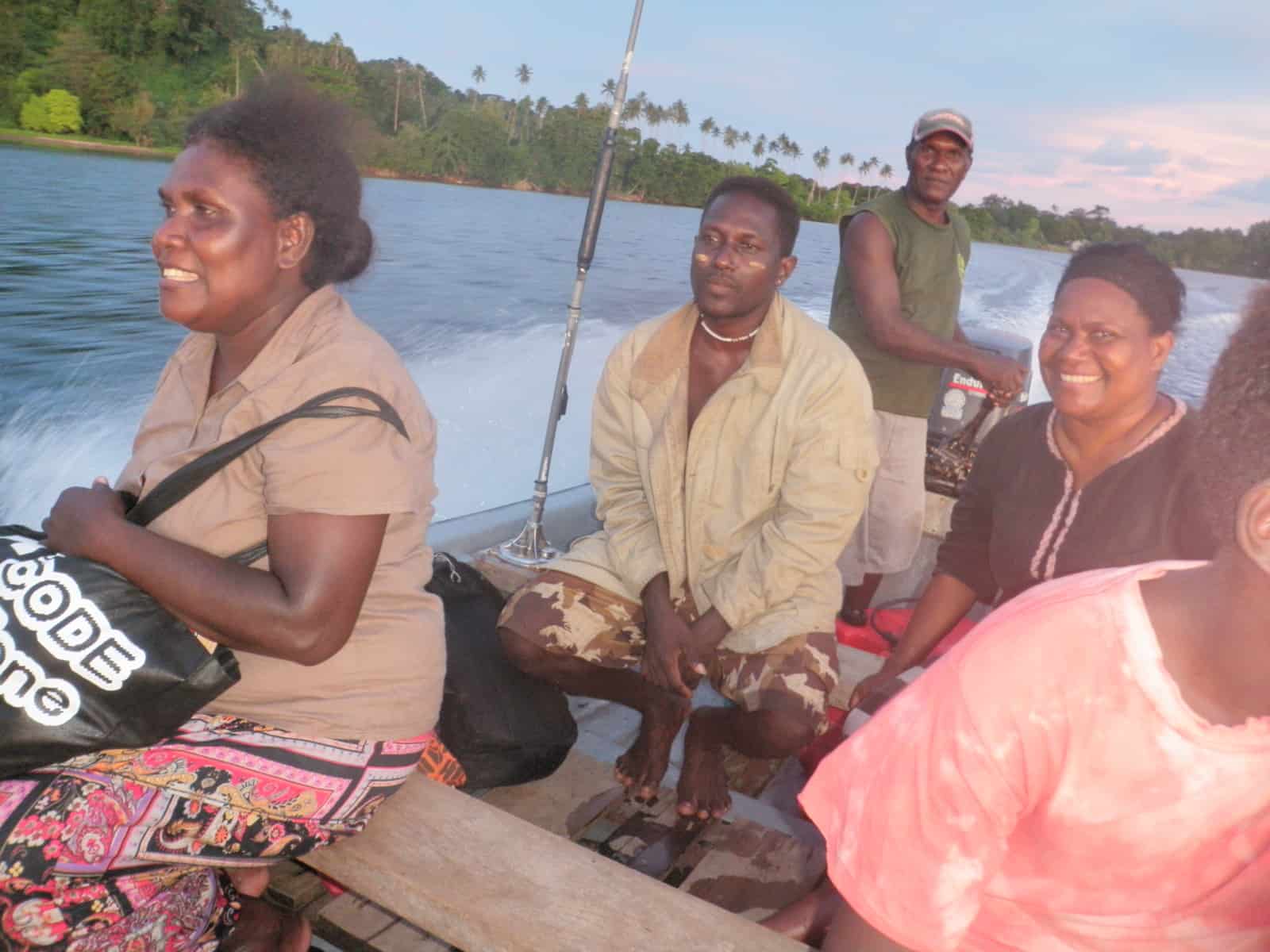Image: Simbo for Change: Esther Suti sitting at the front of the boat with the PLP team. Photo credit Lesley Hoatson.
Supporting local leadership: Lessons from Solomon Islands
Simbo for Change is a single-island community development and livelihoods project based in the Solomon Islands. It began in 2012 as a project under the Australian-funded Pacific Leadership Program (PLP) and now, three years after donor involvement finished in 2017, continues as a local movement. Simbo itself is a small island with a population of 1,800 people, where this smallness was central to mobilising the island community.
Aid agencies are often beguiled by the lure of ‘scaling up’ from successful ‘pilot’ projects. Simbo for Change offers lessons for other initiatives and programs.
Most notable among them is that supporting local leaders requires external parties to have a very light touch in their approach. External parties also need to invest a lot of trust in allowing local leaders to set their own agendas.
The Simbo for Change project:
- Mobilised local skills and resources, built self-reliance and then connected the community with external training, resources and markets.
- Increased gender awareness by promoting activities that were led by women.
- Developed food security and experimented with marketable agricultural commodities before connecting them into value chains.
- Improved financial skills and systems for managing money.
Simbo for Change was started by Esther Suti, a Simbo woman based in Gizo, the provincial centre. Esther was an essential catalyst for change. She worked carefully within the informal structures of her own tribe, consulting with chiefs and other local leaders and then incorporating others from around the island. This allowed others to take ownership of the program as a collective project.
The project built upon existing skills already present on the island. Simbo women had always been respected as capable weavers and gardeners. Simbo for Change generated a sense of collective pride and processes where knowledge could be shared, and the whole community could benefit from honey production or other small-scale livelihoods.
Most of the livelihoods training focused on women, but because activities were regarded as belonging mainly within the field of women’s work, men did not feel threatened by this. This gave women more negotiating power, without explicitly disrupting the social order in a way that might generate backlash or jealousy. By locating the livelihoods work in existing family units, the project did not separate women from men and provided a positive model of cooperative work. Men largely felt included as beneficiaries of the project, while women retained considerable control over the additional income they earned.
Simbo is part of a broader subregion of islands within Western Province that have deep historical connections with each other. It is a mistake to assume Simbo is ‘isolated’. However, the links that Simbo people have had to government services or income-generating opportunities have been limited. Simbo for Change has helped to restore some old connections and to make new ones that build relationships across the Pacific and beyond.
The involvement of Women in Business Development International (WIBDI, a Samoan NGO) was remarkable. Not only did Esther and Adi Tafunai, the director of WIDBI, create a close personal friendship, sharing strong Christian values, but the utilisation of Samoan trainers allowed Simbo people to feel connected to a broader Pacific community. This was taken a step further when, under the project, Simbo people worked towards and gained organic certification for the island as a whole.
Simbo for Change has been guided by the recognition that the economic and the social are interdependent. Esther and Adi would also say that the spiritual is an even more fundamental dimension of life that is overlooked in development programs.
Simbo for Change did not set out to create industrial-scale economic development but was focused on more humble and achievable livelihoods that were understood as embedded in other aspects of community life and well-being. This is an approach that could be adopted by donors in other contexts.

Madegugusu Women’s Association Members from Riguru
By mobilising around an inclusive, collective island identity, the project allowed existing skills and practices to be revalued and extended, particularly in relation to the standing of women in the community. This island identity was not parochial in nature but outward-looking and reaffirmed by stronger connections to off-island markets, organic certification, renewed interest from provincial and national government authorities, and from the trans-Pacific friendships established with Adi and other Samoan trainers. Simbo for Change addressed the lack of recognition and the material inequalities that, elsewhere in Melanesia, have generated conflict at the island scale.
For PLP, supporting these processes was largely about allowing Adi and Esther to go about their work without imposing external demands and without insisting that the project’s outcomes should be articulated in particular ways.
The structures of donor agencies struggle to accommodate the flexibility required for this kind of work to be sustained. Nevertheless, for Program Managers with the courage and nous to take ‘Doing Development Differently’ or ‘Thinking and Working Politically’ principles seriously, Simbo for Change provides evidence that positive results can follow from investing trust in local leadership and supporting processes of change with a ‘light touch’ by providing connections, modest resources and appropriate mentoring.










